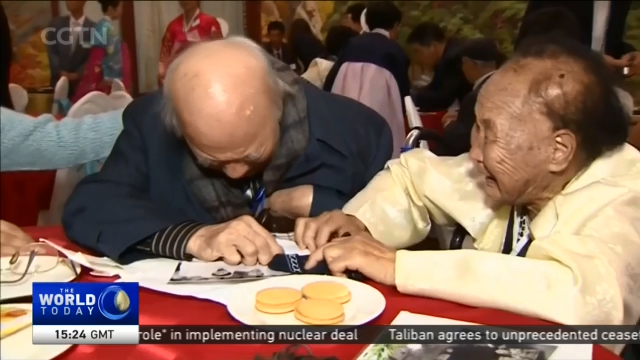
09:03, 10-Jun-2018
Hopes of Reunions: Inter-Korean family reunions planned later this summer
02:32

Relations between the Republic of Korea and the Democratic People's Republic of Korea have improved following April's historic summit. The two sides agreed then to hold family reunions later this summer. That's welcome news for families that were separated during the Korean War. But time is running out for those hoping for one last chance to reunite with their loved ones. Shane Hahm reports.
92-year-old Seung Byeong-il was born in the city of Chongju in present day DPRK.
His fondest memory in his youth is playing with his friends in a nearby stream.
When Korea was liberated from Japanese colonial rule in 1945, Seung made his way to Seoul to look for a job.
But when the Korean War erupted five years later, little did he know it would be his last chance to visit his hometown.
SEUNG BYEONG-IL SEPARATED FAMILY MEMBER "When I was young, I remember the river in my hometown would flood every summer, so we weren't able to go to school. We had to take a longer route. But that's just an old story now."
The ROK and DPRK have held 20 rounds of reunions since dividing more than six decades ago.
Those with memories of life on the other side of the demilitarized zone are now elderly.
And the list of South Koreans wanting to participate in family reunions dwindles every year.
SHANE HAHM SEOUL "Inter-Korean reunions are organized by the Red Cross. Typically, 100 individuals from each side are randomly selected. Participants reconnect over a three-day span. But that's hardly enough time to make up for the decades of separation."
PARK JUNG-HI, GENERAL SECRETARY KOREAN ASSEMBLY FOR REUNION OF TEN MILLION SEPARATED FAMILIES "Honestly, I'm a little worried. Only 100 people are going to be allowed to participate again. Despite the government's intentions and the media exposure, many more separated families will be disappointed. At this pace, it will take decades for everybody's hopes to come to fruition."
Both sides agree reconnecting families separated by the Korean War is a pressing issue.
Following April's inter-Korean summit, the hope is that reconciliation goes beyond just family reunions.
SEUNG BYEONG-IL SEPARATED FAMILY MEMBER "If the day I'm able to travel to my hometown comes, the first thing I want to do is visit my mother's grave. Sure, it would be nice to see and visit where I grew up and where I spent my childhood. But above all, the first thing would be to pay my respects to my mother."
Seung is among a generation of Koreans that suffered through war and separation.
He wishes future generations won't have to experience the tragedy of a divided people. Shane Hahm, CGTN, Seoul.

SITEMAP
Copyright © 2018 CGTN. Beijing ICP prepared NO.16065310-3
Copyright © 2018 CGTN. Beijing ICP prepared NO.16065310-3